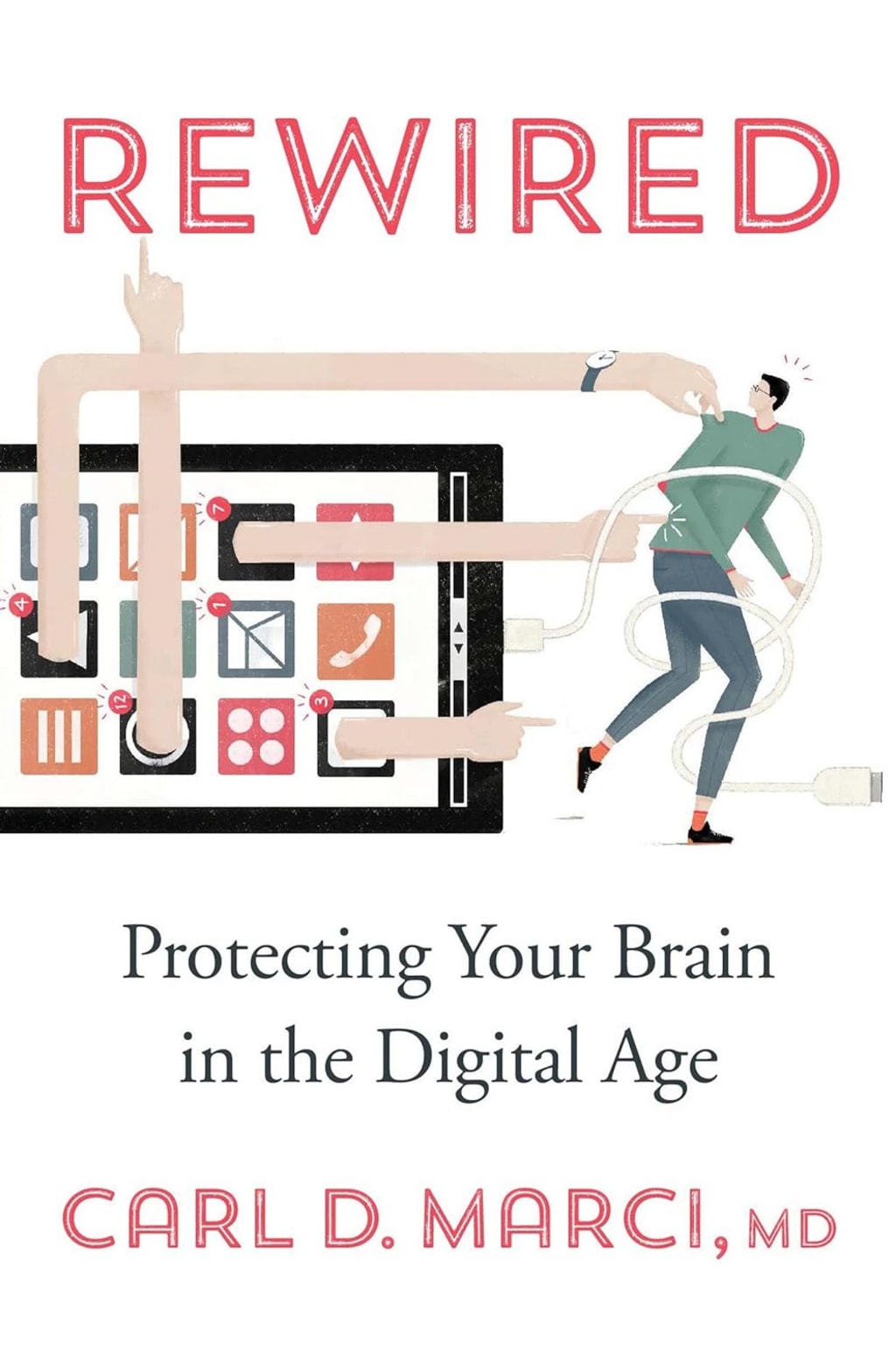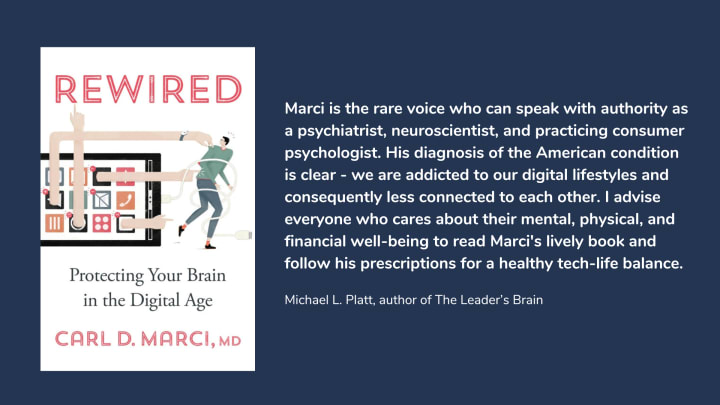Book Review: "Rewired" by Carl D. Marci
2.5/5 - interesting, but lacks where it really matters...

Yes, I am still reading political philosophy and social sciences and I am still learning about a bunch of different things. Have I doom-read myself into oblivion? Also, yes. I am fully convinced that the world is going to complete and utter rubbish because of a group of factors that are too easily allowed to roll in and push our society off the edge of the metaphorical cliff. Take a look through my recent posts if you want to know more about what I've been reading but Rewired is by no means the first I've read on the topic of social media addiction - though that seems to be the theme of the day in most outlets of news and media.
The author of this book begins by explaining an experiment he did that though I can poke some holes in it, I won't for the sake of the writing and the outcomes actually being quite good and quite telling to a larger problem. The experiment consisted of a group of women aged 18 through to 22 watching television. Group A would have their smartphones on them and Group B would not. He found that the women in Group B became physically stressed and agitated whilst watching the television, with some even getting up and leaving whereas, Group A did not display any of these behaviours and sat through one hour of television with zero stresses. Obviously, for those of us who recognised it, this was a simple imitation of the 'Skinner-Box' experiment which the author then goes on to explain the purpose behind. This neural rewiring has led us to discuss social media and smart phone usage by using the language associated with drug addiction. Why? The behaviours of withdrawal that are displayed are exactly the same as those suffered by drug addicts.
The author describes how neural rewiring starts on the day we are born and shapes our identities until the day we die. He states that this level of neural rewiring by an addiction to smart phones and screens has resulted into people suffering some quite dire consequences including: people falling off cliffs and dying because they weren't looking at where they were going since they were on their screens, peoplg becoming injured by focusing too much on their screens and not on their surroundings and even drivers getting into accidents for spending a micro-second on their screen instead of looking at the road. Now of course, the driving thing cannot happen to children since they don't drive - it happens to adults too. So, how did this screen craze hit the ceiling?

Thankfully, the author answers this question as well by describing the Pandemic Era as being one of the worst times in history when it came to screen addiction. If the 20th century really did lay the foundations for mass consumption through people preferring commodities rather than anything else to satisfy their lives and make them happier, then the 21st century really got that underway in the screen revolution - making that particular epidemic worse than ever. And that is the spending epidemic.
Targeted advertising, the author explains, becomes ubiquitous since we are always on our devices and they are always on our person, it becomes very easy to reach us through advertising this way. I think we have to look at how the author recognises that this advertising boom has happened in less than twenty years and we are only beginning to see the mass consequences of what has happened. We probably face much worse things to come.
I think one point I especially enjoyed in this book was when the author stated that we no longer experience any form of boredom - even in queues and whilst we are waiting, we sit on our phones and we stare at our screens as forms of socialising or entertainment. Therefore, we are less likely to perform tasks we consider to be dull and are less tolerant towards them. To be honest, I would like to know what the author means by a 'dull task' but apart from that, I can agree that tasks that we find subjectively dull are less likely to be carried out effectively.
As I write this myself, I have just cleaned my bathroom and tidied up and now I am sitting down to write a review - I imagine that if I were a social media addict myself, the tidying would never have been done. However, a review is something I truly enjoy writing and therefore, would not constitute as a 'dull task'. The tidying may be enjoyable, but it is more of a necessary task. I'm not sure whether this constitutes that task as dull, but I did not spend it checking social media. So, as of yet, I am not 100% sure of what a 'dull task' is - but I'm guessing I'm somewhere in the ball park.
The author then goes through something I have heard a lot about in my readings on current affairs in the social sciences and modern political philosophy world: the pre-frontal cortex. This is the part of the brain which controls impulses, develops critical thinking skill and regulates (though does not produce) our emotions. Of course, when it comes to the pre-frontal cortex, we know already that teenagers do not have a very developed one in comparison to adults and so, are more likely to commit to social media addictions under impulse.

The author demonstrates how this addiction to social media is changing the way children learn, what they learn, how they memorise things and how they are able (or unable) to recall these memories. One of the examples of this he gives, is the Baby Einstein videos and their downfall from educational, to entertaining content as the research did not support that the babies and toddlers were actually able to physically learn anything. On top of that, some studies found that the videos were actually slowing down the learning process and language acquisition rates of many of the children who watched them.
However, there was a point that I was a little shaky on agreeing with as there were parts of the argument that I did not find to be backed up by any realistic evidence and simply stating a fact is not evidence of the thing actually happening (shoutout to Alex Edmans and his book May Contain Lies for that one). This argument is that because adults also hyper-consumer media, they are becoming more divided and depressed in society than ever before. Let me explain how the author goes through it. First and foremost, he states that adults have found this type of screen-based lifestyle more convenient.
As an adult, I love the whole online banking thing which means I get to see my balance in real time and I don't have to physically go to the bank very often. The author also found that adults consume many different types of media at the same time and tend to work in places that were previously free of work. (As I type this, I am lesson planning in my bedroom, sitting on my bed with one of those desk table things in pink). However, the statement that this is making us more divided and depressed is something that there is no evidence for in the text. It might as well be doing that, but I can't see a study, I can't see any statistics and I can't see any data. Therefore, as a statement, it doesn't go very far and I cannot accept it as fact even if it is actually a fact according to the author.
I think that for these blanket statements, there needs to be more than the case study at the beginning of the book to support them. The advantages of this online world for adults very clearly outweigh the disadvantages. It's more about accessibility than anything else. Social media is not too much of a concern where adults are concerned - but accessibility has sky-rocketed and has found us carrying less baggage around and being more productive and even being able to do our shopping, banking and calling all from one device.
According to the author, super-stimuli is everywhere in our society and its exaggerated in every facet of our lives, rewiring the brain's normal functions and changing the way we think. This is most likely true and the author does follow it on with a brief look at the science of addiction. Well-explained as it is, it only states that things exist and how they exist. It does not offer any solution to them. For that, we might need to look at Gabor Mate's In the Realm of Hungry Ghosts instead.
When it comes to addiction, we are met with another issue - the addiction changing the way we communicate altogether. Now, the author does well at describing how this is happening (through lowering empathy because of the lack of nonverbal cues being observed in the smart phone communication world) but he does not do a very good job at providing real tangible evidence. Since I read May Contain Lies, I've been looking into what could possibly be considered a 'reverse engineered hypothesis' and this is it. One of the situations described was an observation of a group of women using their phones at the dinner table of a restaurant instead of communicating with each other and what was observed there.
This is an uncontrolled environment where it is highly possible and probably even most likely that the researcher was looking for particular evidence to suit their own biases. Why did they not observe people replying to a text message and getting right back to their conversation? Why did they not observe someone on a phone call rather than texting? It didn't suit their conclusions. They were looking for the most extreme lone case to project their biases on to and therefore, this evidence cannot be counted as data. As readers, we do not even know if the situation the researcher was observing even happened so why it is being included in a book primarily concerning evidence and research, I will never know.
The author then goes through the standard ways to 'fix' this addiction which have thus far proved to be fanciful at best. Though this is a good book, there are moment of shakiness where the text fails to give itself the credibility it requires to expand its viewpoint. With a bit of editing and peer review, this may have changed but for now I have to say that though it is interesting, it is probably not the most informative.
About the Creator
Annie Kapur
200K+ Reads on Vocal.
Secondary English Teacher & Lecturer
🎓Literature & Writing (B.A)
🎓Film & Writing (M.A)
🎓Secondary English Education (PgDipEd) (QTS)
📍Birmingham, UK






Comments
There are no comments for this story
Be the first to respond and start the conversation.